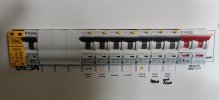I lived in London, and power surges emanating from outside the home seemed exceedingly uncommon there in comparison to most of the United States, although I have no hard data.i mean these type of devices, regarding how many kA - i dunno how to calculate the proper value or if 50kA is too much/etc
also hard to say,
i live in central EU close by Germany.
According to the mountain of anecdotes on this subject, external power surges are most common in places with frequent thunderstorms, certain geological characteristics, hot summers (heavy AC usage causes grid disturbances), and unreliable power grids. Everyone who has lived in Florida seems to know someone who has experienced a large power surge.
This device can dissipate up to 50,000 amps of current, which is toward low end for these types of devices, at least for the ones on the market here in the United States. Type 1 and type 2 surge protectors sold in the United States commonly have ratings between 80,000 and 200,000 amps. Those beefier devices would not fit inside the service panel, unlike this unit.
But this device may be perfectly adequate to offer you some protection against power grid problems and is almost certainly more effective against big external surges than any widely available point-of-use surge protector.

